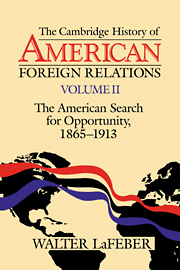Book contents
- Frontmatter
- 1 Springboards and strategies
- 2 The second Industrial Revolution at home and abroad
- 3 Race for empire
- 4 “America Will Take This Continent in Hand Alone”
- 5 Crossing the oceans
- 6 1893–1896: chaos and crises
- 7 The empire of 1898 – and upheaval
- 8 Pacific empire – and upheaval
- 9 Theodore Roosevelt: conservative as revolutionary
- 10 William Howard Taft and the age of revolution
- Conclusion: The 1865–1913 Era Restated
- Bibliographic Essay
- Index
- THE CAMBRIDGE HISTORY OF AMERICAN FOREIGN RELATIONS
- References
9 - Theodore Roosevelt: conservative as revolutionary
Published online by Cambridge University Press: 28 March 2008
- Frontmatter
- 1 Springboards and strategies
- 2 The second Industrial Revolution at home and abroad
- 3 Race for empire
- 4 “America Will Take This Continent in Hand Alone”
- 5 Crossing the oceans
- 6 1893–1896: chaos and crises
- 7 The empire of 1898 – and upheaval
- 8 Pacific empire – and upheaval
- 9 Theodore Roosevelt: conservative as revolutionary
- 10 William Howard Taft and the age of revolution
- Conclusion: The 1865–1913 Era Restated
- Bibliographic Essay
- Index
- THE CAMBRIDGE HISTORY OF AMERICAN FOREIGN RELATIONS
- References
Summary
Distinguished scholarly work on Theodore Roosevelt has concluded that his conservatism, moralism, and keen sense of balance-of-power international politics are the keys to understanding this highly popular and influential president. On the centennial of his birth, he was celebrated with a Time magazine cover story in March 1958, at the nadir of the Cold War. Time applauded his use of “a new kind of power – deterrence” to “promote the U.S. self-interest in …. world order.” One biographer notes “that a deep-seated conservatism formed his basic political outlook.” Another concludes that “he believed in change, but gradual change; change within established institutions.” A third argues that it was not TR’s blustering and quick use of force that marked his diplomacy as much as careful balance-of-power calculations. A fourth, taking a cultural approach, believes that “TR’s willingness to use civilization as a political guideline marked him as a major figure in the rise of American internationalism,” and his view of “civilization,” which belonged to a simpler past, made him “the last traditional American statesman.” One of the first analysts of his statecraft, Alfred L. P. Denis, who remains one of the best, observed that “his apparent impulsiveness … obscured in some ways the essentially conservative quality of his statesmanship.”
If these arguments are correct, two questions arise: Why did TR’s conservative diplomacy time and again result in upheaval, imbalance, and even revolution, and why did he interpret his presidential powers in foreign affairs so radically that he would probably have upset his great conservative hero, Alexander Hamilton? If the argument, as some advance it, is that the context of his time drove this conservation to extremes, then that context has to be carefully and fully developed.
- Type
- Chapter
- Information
- The Cambridge History of American Foreign Relations , pp. 183 - 209Publisher: Cambridge University PressPrint publication year: 1993



